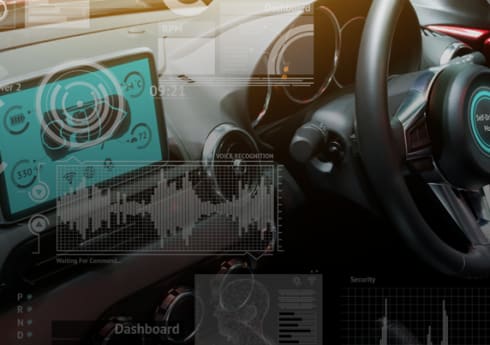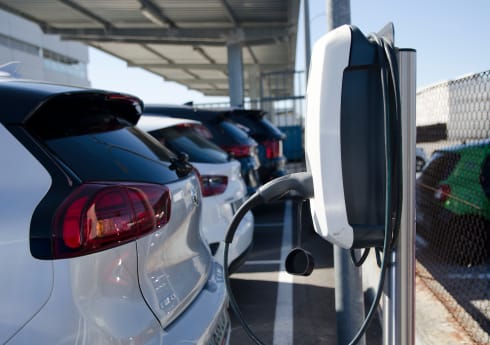The Cost of Charging an EV
Businesses running electric vehicle fleets and considering EV charge points may have concerns over the cost of charging an EV.
Well, in this feature guide we’ll take you through the costs and how charge points can help. Plus, you can compare the market to find the very best EV chargers.

What’s the cost of charging an EV?
The cost of charging your fleet’s electric vehicles depends on three key things. The:
- Type of EV you have.
- Electricity tariff you’re charging from.
- Type of charger you use.
If you have a charge point that covers 54kWh, then your cost to charge an EV to 100% will be around the region of €9.10. That means the monthly cost for a standard EV would be €36.00 (there or thereabouts).
Although those stats are for home chargers—rates will vary depending on location. At your business premises, you’ll likely find the rate to be higher. It also depends on the type of EV you have, as manufacturers all offer different charging speeds.
To use a public fast charger, you’ll find the cost between €6-€10 for each charge. Home chargers are usually around €0.15 per kWh.
As you can see, then, the cost of charging an EV in Ireland depends on a variety of things. There are other factors to remember, too:
- EV battery size.
- Usage and daily miles driven.
- EV weight and design.
- Weather and environmental issues (whether it’s summer or winter).
- Energy usage and setup.
Below we’ll explore the key areas in detail so you can get a good understanding of the type of charges you can expect.
How EV charge cards help your business
Whether you have charge points or not, remember you can use EV charge cards for your business. These can help with the cost of charging an EV and also help your fleet use many other charging points they may find across Ireland.
Using en-route charge points may be necessary for many of your drivers. With a charge card, it makes your life a lot easier. You can use them at public charge points within your network.
All you need is one card and your spending will come out of one invoice. It simplifies your charging needs and will be a big helping hand for your fleet.
How EV batteries differ
Different EV models have different batteries, so charging speeds are always going to be a bit different. The average battery size right now is around 54kWH.
That means the information you come across online usually refers to a 60kWh battery. When you’re looking around online for costs of charging, you should keep that in mind. Results are based around that battery size.
Every model is different! For example:
- The Tesla Model 3 has 75kWh, which is high up the scale.
- The Smart EQ Fortwo has a 17.5kWh.
Your best bet? Make sure you know exactly what battery you’re getting if you’re buying an EV. It can significantly impact on the type of model you want, along with the charging costs you’ll have to pay.
The cost of an EV charging station
Okay then, now let’s take a look at the next important step—EV charge points. These units can be installed for commercial reasons, at your employees’ homes or at your business hub.
EV charging stations costs will differ from one unit to the next.
They will range from €300-€1,000. Which is why doing market research is good business practice so you’ll know exactly what the cost of your preferred EV charging station is.
EV charging station installation cost
An EV charge point cost depends on the provider you choose. Some example costs will be around €699.
Part of the cost is you can’t install the station by yourself. You’ll need a qualified electrician to do that!
But remember, you can apply for the SEIA government grant initiative to help you save money with that transition. These can knock some of the costs off the installation fee with up to €600 in financial support.
This is where comparing the market is essential, as you can find the best installation costs. Remember, you can do that for free while you’re here—it’ll give you a solid idea of the best deals available across Ireland.
Charging costs for your business
There are three types of charging points your business needs to keep in mind:
- Workplace chargers.
- Home chargers.
- Commercial chargers.
Remember, some electricity providers have special tariffs with electric vehicles in mind. It can reduce the cost of charging by up to 50%. That’s very handy if you’re primarily offering charging at your business premises.
However, the cost to charge EV at home is often significantly lower than at a business location. Home chargers for EVs are usually around €0.15 per kWh. That’s a much lower EV charging cost than your business can likely get.
That’s worth keeping in mind for your business. If you install many of these at your employees’ locations, you can expect some significant savings on a long-term basis.
How long does it take to charge an EV?
There are three different speeds you can expect from a charge point and the EV you have. Some can fully charge in less than 30 minutes while others will take over 10 hours.
Here’s a quick breakdown of the three main types of charging speeds:
- Slow charging: These run at around 3kWh, meaning a 40kWh battery will need 12 hours to charge to 100%.
- Fast charging: Able to run between 7kWh-22kW, this means it’ll take between 6-12 hours for a 100% charge. This also depends on the type of battery you have.
- Rapid charging: Super-fast charging runs from 50kWh-350kW, so your EV may charge in 30 minutes or less. This depends on the type of model you have and the battery in the EV.
In short, charging times can vary. It’s true. And that’s why it’s good business practice to make sure you know what type of battery you have before committing to an EV.
Is it cost-effective to buy an EV in Ireland?
Yes, for most businesses, running an EV will save you money in the long-term. That’s due to exemptions from road tax, lower levels of vehicle maintenance required and they’re cheaper to run than diesel/petrol vehicles.
The only downsides right now are EVs are more expensive than traditional vehicles. Plus, they don’t have as much range.
But for most SMEs, and large organisations, EVs are a sensible investment thanks to:
- Charging costs: The cost of charging an EV fleet is around 60% cheaper than a petrol equivalent. And also around 50% less than a diesel fleet. Factor in the road tax exemptions and most businesses are onto a winner here.
- Road tax exemptions: No charges for road tax.
- Servicing savings: EVs don’t need an oil and filter change, which’ll save you about €116 annually).
The future for business fleets is electric. There’s no denying in Ireland, and the UK, the governments will move to limit the sale, and use, of petrol and diesel vehicles over the next decade. The time is now to start making the shift to an EV fleet.
Save money on charging your EVs
Want to make the most of your EV charging opportunities? Compare the market for the best EV charge points. All you need to do is:
- Enter your business details.
- Search the Irish market.
- Take your pick from the recommendations.
Make the cost of charging an EV lower than ever. Find your perfect deal in seconds and take things from there. It’s free to compare and will save you money in the long-term.



